Welcome back to This Week in Apps, the weekly TechCrunch series that recaps the latest in mobile OS news, mobile applications and the overall app economy.
The app industry continues to grow, with a record number of downloads and consumer spending across both the iOS and Google Play stores combined in 2021, according to the latest year-end reports. App Annie says global spending across iOS, Google Play and third-party Android app stores in China grew 19% in 2021 to reach $170 billion. Downloads of apps also grew by 5%, reaching 230 billion in 2021, and mobile ad spend grew 23% year-over-year to reach $295 billion.
In addition, consumers are spending more time in apps than ever before — even topping the time they spend watching TV, in some cases. The average American watches 3.1 hours of TV per day, for example, but in 2021, they spent 4.1 hours on their mobile device. And they’re not even the world’s heaviest mobile users. In markets like Brazil, Indonesia and South Korea, users surpassed five hours per day in mobile apps in 2021.
Apps aren’t just a way to pass idle hours, either. They can grow to become huge businesses. In 2021, 233 apps and games generated over $100 million in consumer spend, and 13 topped $1 billion in revenue, App Annie noted. This was up 20% from 2020 when 193 apps and games topped $100 million in annual consumer spend, and just eight apps topped $1 billion.
This Week in Apps offers a way to keep up with this fast-moving industry in one place with the latest from the world of apps, including news, updates, startup fundings, mergers and acquisitions, and suggestions about new apps and games to try, too.
Do you want This Week in Apps in your inbox every Saturday? Sign up here: techcrunch.com/newsletters
Top Stories
Google introduced a “Privacy Sandbox” for Android

Image Credits: Bryce Durbin / TechCrunch
Google this week introduced its take on Apple’s App Tracking Transparency system with the reveal of the Privacy Sandbox for Android. The system is based on the Privacy Sandbox initiative for Chrome, but isn’t going live anytime soon. Instead, Google says its current system will remain active for at least two more years while it runs tests.
Google — which makes a majority of its revenue from advertising let’s not forget — is going in a different direction than Apple did. Google even took a bit of a swipe at Apple when announcing the news, noting that “other platforms have taken a different approach to ads privacy, bluntly restricting existing technologies used by developers and advertisers.” It says this sort of approach is “ineffective” and leads to “worse outcomes” for user privacy and developers. Google then touted its system as one where it will work with the industry and developer community to balance the need for user privacy with businesses’ needs. (Not to mention Google’s own.)
The system, broadly, will involve phasing out the Advertising ID tracking feature, while still allowing advertisers to show personalized ads to groups of users with similar interests. This is based on Google’s work developing “Topics,” which offers users more control and transparency over the ads they see. It will also offer some level of attribution reporting to advertisers and a developer SDK. (A technical run-through is here.) Already, the system has support from Snap, Rovio, Activision Blizzard, Duolingo and others.
Google’s decision to engage in dialogue, rather than rolling out a policy change that disrupts the existing ecosystem, makes sense for the company because so many Android apps are free and ad-supported, compared with apps on iOS. Plus, Android serves as a gateway to serve ads, which benefits Google’s bottom line. In addition, Google pointed out that Apple’s approach can lead advertisers to turn to other, less visible means of tracking users which is bad for users, too. In fact, it says this is already happening, pointing to a study by ex-Apple engineers that backed up this opinion. The study showed how trackers built features to circumvent Apple’s ATT rules, making ATT something that only gives the illusion of privacy in the long run.
But critics have slammed Google’s plans as “toothless,” as an optional system for advertisers, and others noted that Google can’t even really do anything to prevent its competitors from running “effective ads on Android” since it’s already facing antitrust accusations of being an ad monopolist — which limits its ability to change things in this space. Then there’s the fact that Google’s announcement was more of a plan to create a plan (after much discussion) than it was any sort of definitive step forward. In the end, there isn’t much detail as to how all this works because there just aren’t details yet — they’re TBD. Meanwhile, Android user privacy remains unimpacted.
Crypto apps’ Super Bowl ads paid off
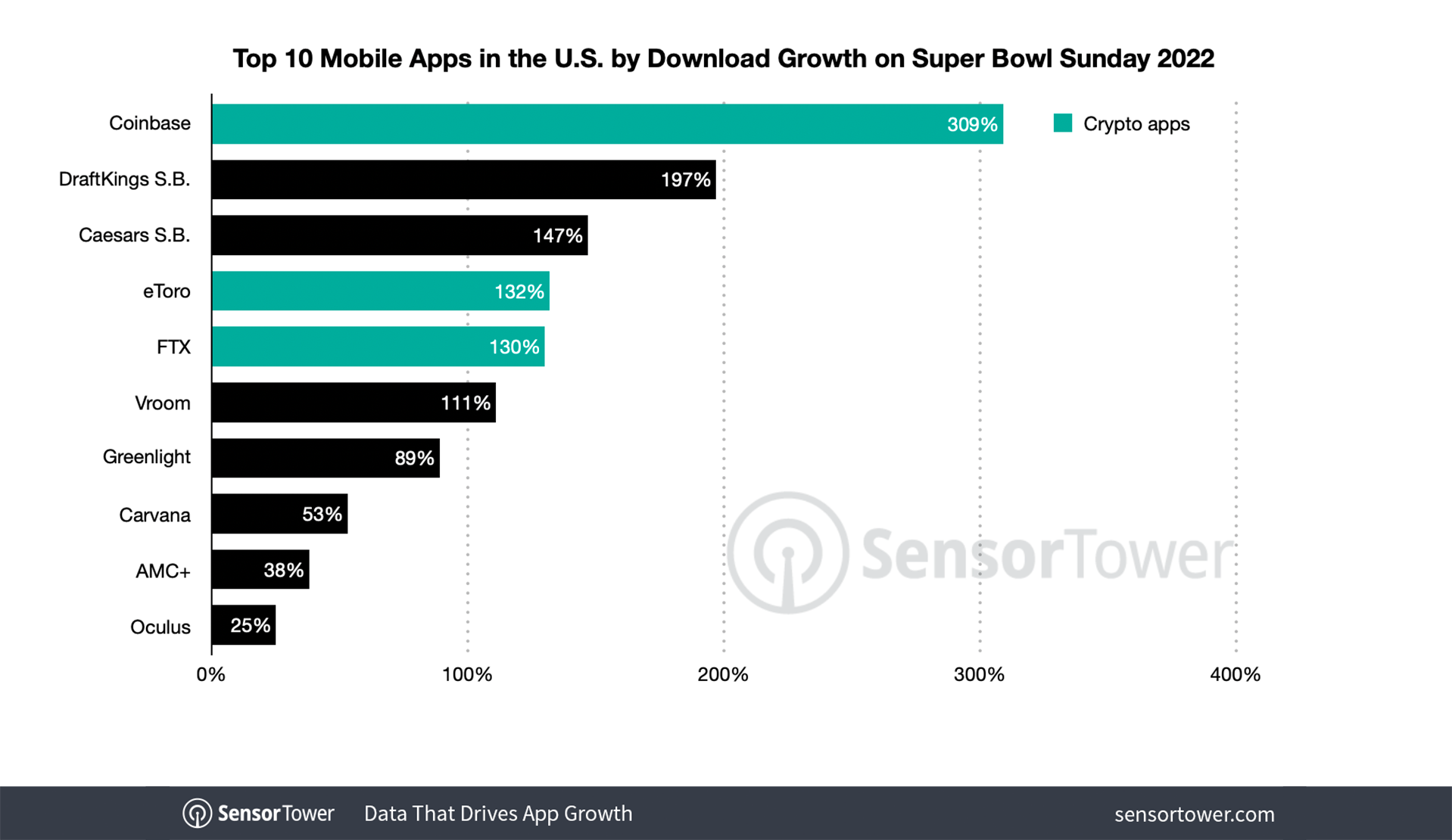
Image Credits: Sensor Tower
The Super Bowl ad spots paid off for a number of tech companies, not just in terms of exposure, but also app installs, a new report indicates. But Coinbase’s viral ad — which just bounced a QR code around on a black screen like the old DVD screensaver — outperformed the group, with installs jumping 309% week-over-week after the ad’s airing Super Bowl Sunday, February 13, and it continued to climb by another 286% the following day, according to Sensor Tower data.
Among the top five apps whose ads delivered strong download growth, three were crypto apps. In addition to Coinbase, crypto trading platform eToro grew app installs by 132% week-over-week on February 13, and by 82% on February 14. Meanwhile, Cryptocurrency exchange FTX, whose ad featured “Curb Your Enthusiasm” star Larry David, saw a 130% boost in downloads week-over-week on February 13, followed by 81% growth the next day. Collectively, Coinbase, eToro and FTX saw their U.S. installs grow by a collective 279% on February 13 compared to the week prior. This continued into the following day, when week-over-week download growth reached 252%.
Other apps that did well during the big game were sportsbook apps — but they may have seen downloads pop anyway!
App Annie rebrands to data.ai…for reasons
The company announced this week the new name will reflect its “vision to drive comprehensive digital performance with products and partnerships.” Arguably, it will also unlink the old brand name from the embarrassing news last fall which saw both the firm and its co-founder charged with securities fraud. App Annie and former CEO Bertrand Schmitt had to pay more than $10 million to settle the fraud charges related to its deceptive practices and making material misrepresentations about how its data was derived. The firm had used non-anonymized data to alter its estimates, and even directed engineers in China to manually update its estimates at times, before automating those adjustments to better match up with the actual — and confidential — revenue and download figures it had from clients. Oops!
The new company name implies those days are behind it, as it references how it will fuel its digital insights using the power of artificial intelligence (AI). Related to this news, data.ai also announced a new reseller agreement with Similarweb that will allow the firm to offer a unified mobile and web market data set.
Weekly News
Platforms: Apple/iOS
- Apple’s iOS 15.4 beta 3 and iPadOS 15.4 rolled out to developers and public testers ahead of the rumored March release. The beta is now prompting users to add an emergency contact in their Emergency SOS setting, if they don’t have one set up already, testers found. The beta also offers 37 new emoji symbols, and an update to Face ID that allows it to work when a face mask is worn.
Platforms: Google/Android
- Google is testing iOS-like app update progress indicators, XDA Developers reported. App icons in the launcher that are being updated or installed for the first time will appear greyed out with a progress bar around the app to indicate their install or update progress.
- Spotify released an internal tool called Ruler, which can be used to measure Android app size, to the broader community. To use Ruler, developers can apply the plugin to their project then run a single Gradle task.
- Google has been working on a way to stream apps and notifications from a Pixel phone to a Chromebook or PC, according to a report by 9to5Google, which tested it.
- Microsoft rolled out access to the Amazon Appstore Preview in Windows 11. The app store was previously available only to beta testers with a limited number of apps. It’s now more broadly accessible and offers access to over 1,000 apps and games, including Amazon’s Kindle, Clash of Kings, Coin Master, Lego Duplo World, The Washington Post and others. Now to see if there’s any demand…
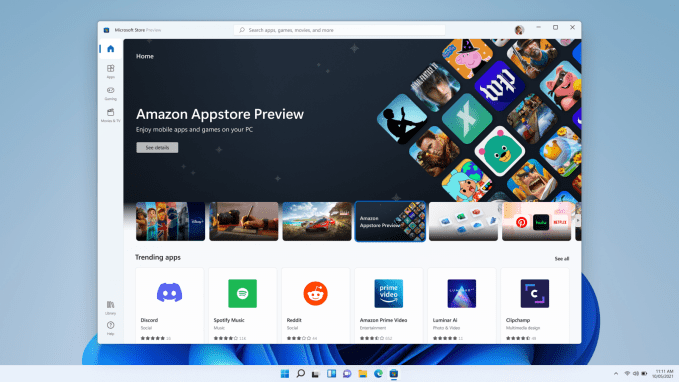
Image Credits: Microsoft
Augmented Reality
- A new AR software platform called Perceptus from Singulos Research, profiled by Wired, acts as a layer above existing AR technologies like Apple’s ARKit or Google’s ARCore. App developers provide the 3D models it wants Perceptus to detect, and the platform uses ML to determine all the different ways these objects could be seen in the real world, to make identification easier and more accurate. It also runs locally on the device, which makes it suited for AR glasses down the road.
Crypto
- A recent blog post by Coinbase CEO Brian Armstrong is making the rounds after The Verge called further attention to the issues it raised about the power the app stores have over its business. Among the key points are the fact that if having a mobile app presence is required, essentially, then the tech giants have the power to not just dictate the terms (like commissions paid), but also can moderate and deplatform businesses by making calls that go beyond the letter of the law. This is in conflict with Coinbase’s goal to offer a decentralized product, it indicates.
Social
- Instagram introduced private Story “likes,” which appear as hearts next to people’s handles in the Stories view sheet, instead of cluttering up the recipient’s DM inbox.
- Twitter launched Safety Mode into beta. The feature, which lets you automatically block trolls for a period of time while under attack, will now proactively suggest when it’s time to enable it.
- Snapchat will finally let users change their username starting on February 23. You’ll only be able to update your name once per year, however. Other social platforms have had this sort of feature for a long time.
- Snapchat also rolled out a live location-sharing feature for friends, and partnered with Ticketmaster to match users with live events nearby. And it introduced revenue sharing on ads placed inside Snap Stars creators’ Stories.
- TikTok has been scooping up content moderators from companies used by rivals like Facebook, including Accenture, Covalen and Cpl, FT found. The company is luring them with better pay and corporate benefits packages. (The job itself still sucks, though.)
- Trump’s new Twitter-like social media platform, “Truth Social,” opened up to about 500 beta testers, according to Reuters. As of late Wednesday, Trump’s account had 317 followers.
- Glass, the Instagram alternative for photographers, launched Glass 2.0 with iPad support, six months after its public launch. The company said membership has been going well so far, but didn’t offer further details.
Messaging
- WhatsApp for iOS adds the ability to listen to your audio messages while you multitask by reading or replying to different chats. The update is available in version 22.4.75, shortly after the launch of the feature that lets you pause and resume while recording voice messages.
- Google Messages is now Samsung’s default messaging app in the U.S., starting with the Galaxy S22 series. Though the app had always been available, Samsung previously supported its own messaging app. The change will give RCS-powered messaging an expanded reach.
Dating
- Global spend on dating apps topped $4.2 billion in 2021, said App Annie, which has now rebranded as data.ai. That figure is up 95% from 2018 and represents a 30% increase over 2020.
Gaming
- India’s latest ban of Chinese apps included Garena Free Fire, backed by Tencent. The game had been downloaded more than 238 million times in the country, according to Sensor Tower data. However, the Free Fire Max, which launched in September 2021, was still available.
Health & Fitness
- The FDA cleared the first smartphone app for delivering insulin. The system comes from Tandem Diabetes Care and works with the company’s t:slim X2 insulin pump. Users will be able to program their doses via the app instead of the pump itself when the app arrives later this year.
Government & Policy
- Alan Davidson, the newly confirmed head of the National Telecommunications and Information Administration (NTIA), told Axios his agency will be launching a review of competition in the mobile app ecosystem. The agency plans to release a report this summer to inform the Biden administration policy. Davidson said he’s interested in learning the challenges app developers are facing in the ecosystem, but the review also takes into account the privacy and security arguments made by app store operators like Apple and Google.
- Apple was fined again by the Dutch antitrust regulator for applying unreasonable conditions to the dating apps after its order that instructed Apple to allow support for third-party payments. Specifically, the regulator took issue with Apple’s condition that the companies would have to submit a separate app if they wanted to use an alternative payment system, which it said was “unreasonable.” This additional €5 million fine brings the total fines to date to €20 million.
- India banned more than 50 China-linked apps, including big names like Tencent’s Xriver, Garena’s Free Fire, NetEase’s Onmyoji Arena and Astracraft, in addition to Sweet Selfie HD, Beauty Camera, Viva Video Editor, AppLock and Dual Space Lite, which were clones or rebrands of the many of the more than 300 apps that had already been banned in the country due to escalating geopolitical tensions.
- Senators Richard Blumenthal (D-Conn.) and Marsha Blackburn (R-Tenn.) introduced the Kids Online Safety Act, which would require online platforms to give parents more tools to control their kids’ time online, including screen time tools, and those to protect their data, opt them out of autoplay, and control what sort of content they could see.
- California lawmakers also introduced a bill similar to the U.K.’s age-appropriate design code that would limit data collection from younger users, restrict targeted ads, and require age-appropriate design policies, among other things.
Security & Privacy
- Many in the security community aren’t buying the reports about TikTok bypassing iOS and Android device security to access “full user data.” Critics say the app’s use of dynamic code isn’t that scary or weird — it just means it’s partly a web app, which is standard on mobile platforms. The app’s access to user data is still limited by its permissions, and its ability to access clipboard data is now exposed thanks to an iOS update.
- A spyware dealer who sold WhatsApp-hacking technology has pled guilty, the Justice Dept. said. Mexican businessman Carlos Guerrero, who owns businesses in the U.S. and Mexico, sold signal jammers, Wi-Fi interception tools, IMSI catchers (aka “stingrays” which track a person’s phone) and tools that could hack WhatsApp messages.
Funding and M&A
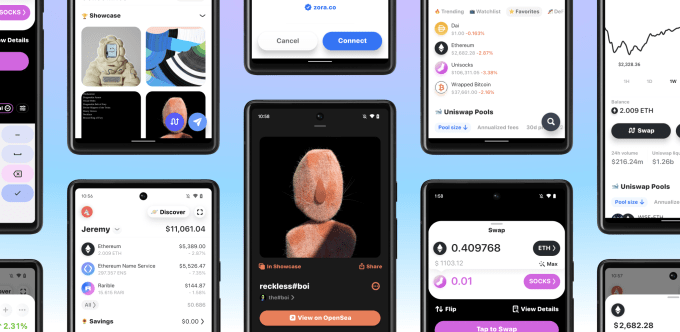
Image Credits: Rainbow
 Ethereum wallet app Rainbow raised an $18 million Series A led by Reddit co-founder Alexis Ohanian’s venture firm Seven Seven Six. The app offers a pleasant and colorful interface that’s helping it take on the top wallet app MetaMask with its broader consumer appeal.
Ethereum wallet app Rainbow raised an $18 million Series A led by Reddit co-founder Alexis Ohanian’s venture firm Seven Seven Six. The app offers a pleasant and colorful interface that’s helping it take on the top wallet app MetaMask with its broader consumer appeal.
 Beem, an app that lets you livestream yourself in AR, raised a $4 million seed round. The company has been around since 2017 but originally did work for clients, like businesses and brands. It’s now more directly targeting consumers and developing a prototype for AR glasses.
Beem, an app that lets you livestream yourself in AR, raised a $4 million seed round. The company has been around since 2017 but originally did work for clients, like businesses and brands. It’s now more directly targeting consumers and developing a prototype for AR glasses.
 Fitness app FitOn raised $40 million in Series C funding led by Delta-v Capital, and announced its plans to acquire Tampa-based corporate wellness platform Peerfit for an undisclosed sum. The LA-based company FitOn hit 10 million users in 2021 and offers workouts from a range of partners, including OrangeTherapy, Zumba, Kingry and others.
Fitness app FitOn raised $40 million in Series C funding led by Delta-v Capital, and announced its plans to acquire Tampa-based corporate wellness platform Peerfit for an undisclosed sum. The LA-based company FitOn hit 10 million users in 2021 and offers workouts from a range of partners, including OrangeTherapy, Zumba, Kingry and others.
 Music therapy app Spoke raised $1.5 million in seed funding led by Ada Ventures. The company employs artists, trained by a team of clinical psychologists, therapists and neuroscientists to produce music to help users achieve a desired mental state, it says.
Music therapy app Spoke raised $1.5 million in seed funding led by Ada Ventures. The company employs artists, trained by a team of clinical psychologists, therapists and neuroscientists to produce music to help users achieve a desired mental state, it says.
 Appboxo raised $7 million in Series A funding led by RTP Global for its platform that lets developers turn their apps into “super apps” either by building their own mini-apps or by accessing them from its marketplace. The company’s clients include GCash, Paytm and VodaPay, among others.
Appboxo raised $7 million in Series A funding led by RTP Global for its platform that lets developers turn their apps into “super apps” either by building their own mini-apps or by accessing them from its marketplace. The company’s clients include GCash, Paytm and VodaPay, among others.
 A conservative dating app called The Right Stuff raised $1.5 million in seed funding from Peter Thiel, according to a report by Axios. The app is expected to launch this summer in D.C. to an invite-only crowd to start.
A conservative dating app called The Right Stuff raised $1.5 million in seed funding from Peter Thiel, according to a report by Axios. The app is expected to launch this summer in D.C. to an invite-only crowd to start.
 She Matters’ app for Black women dealing with postpartum depression raised $300Kin angel funding while participating in the Techstars program, and is working to raise a seed round of $2 million.
She Matters’ app for Black women dealing with postpartum depression raised $300Kin angel funding while participating in the Techstars program, and is working to raise a seed round of $2 million.
Downloads
Shortwave
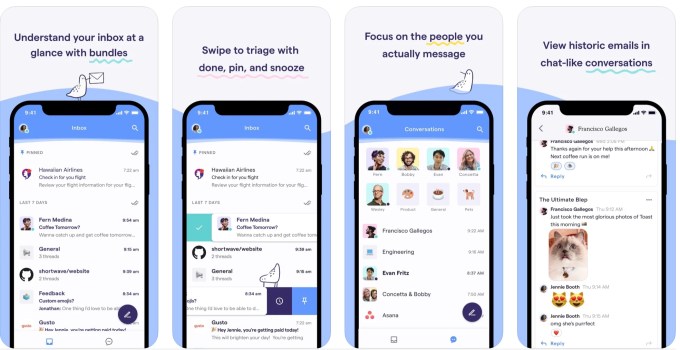
Image Credits: Shortwave
TechCrunch’s Frederic Lardinois took a look at a new startup called Shortwave, which aims to pick up where Google Inbox (RIP) left off. The email app is available on desktop (as a PWA), iOS and Android (beta). It’s designed to function as a “smarter” Gmail client that offers tools for turning messages into to-dos, pinning emails to the top of the inbox, grouping and categorizing conversions, replying to emails with GIFs, reactions, emoji, snoozing messages and more. The app is available for free but will target business users. It offers a Slack-like monetization feature, where users who want access to more than 90 days of email history will have to pay.
Obscura 3
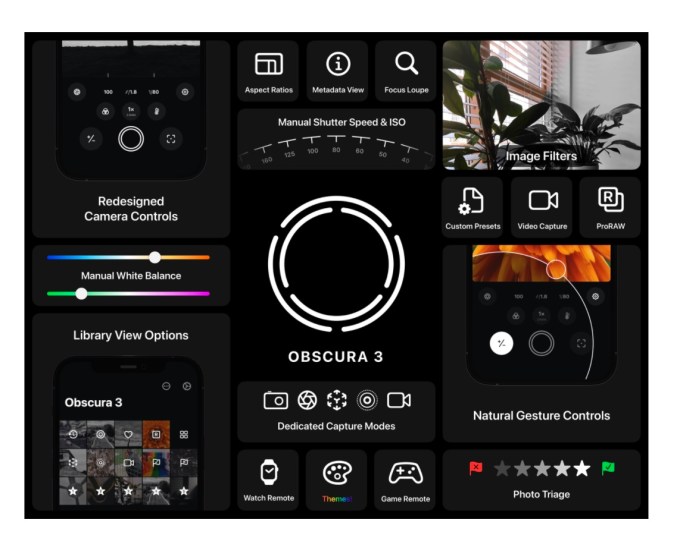
Image Credits: Obscura
The popular Obscura camera app released its latest version this week, which includes a number of new camera features, a refreshed design, improved performance and other changes. The apps’ exposure and focus controls are now controlled entirely by gestures, while haptics provide feedback to let you feel the control without having to look. The app’s capture modes have been updated to reflect the iPhone’s improved camera system, and now offers five separate modes. These include Photo (for fast shooting), Pro Photo (where you can control every aspect like focus, white balance, shutter speed and more), Depth (Portrait effect), Live Photo and an all-new Video mode — the first time the app has supported video capture. The app also added support for alternative aspect ratios, more white balance controls, manual exposure controls and other features. The new app is double the price of the prior version at $9.99, but also ships with a Watch companion, support for connecting controllers and will soon offer Widgets and support for iPad.
from TechCrunch https://ift.tt/yk7VNXs



No comments:
Post a Comment
welcome